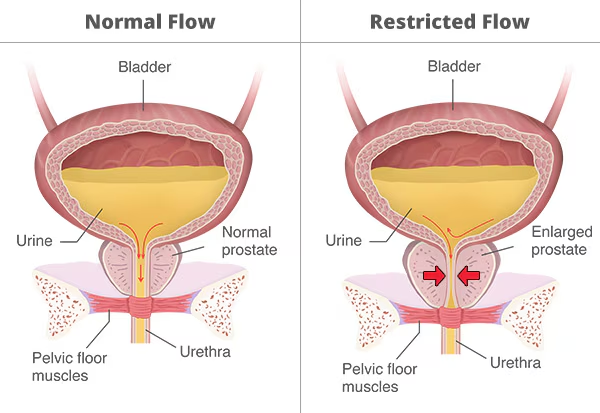Back
Why does it feel like I can't empty my bladder?
By Shannon Strauch, PTA, STMT-1 on 8/20/2024

Post void residual (PVR) refers to the amount of urine left in the bladder after a man finishes urinating. While it's normal to have a small amount of urine remaining in the bladder, higher PVR levels can signal underlying issues that may require medical attention. Understanding the causes and dangers of elevated PVR in men, as well as how pelvic floor therapy can help, is crucial for maintaining urological health.
What is Post Void Residual (PVR)?
Post void residual (PVR) is measured using ultrasound or a catheter to determine the amount of urine left in the bladder after urination. In healthy men, PVR levels are generally low—often less than 50 milliliters (mL). When PVR levels exceed 100 mL, it may indicate a problem with bladder emptying, which could be due to various factors, ranging from prostate issues to neurological conditions.
Causes of Elevated Post Void Residual in Men
Several conditions can cause elevated PVR in men:
Benign Prostatic Hyperplasia (BPH):
As men age, the prostate gland often enlarges, a condition known as benign prostatic hyperplasia (BPH). This enlargement can compress the urethra, obstructing urine flow and making it difficult to fully empty the bladder.Prostate Cancer:
In addition to BPH, prostate cancer can also interfere with normal urinary function. Tumors in the prostate may block urine flow, leading to increased PVR levels.Neurogenic Bladder:
A neurogenic bladder results from nerve damage caused by conditions such as diabetes, spinal cord injuries, or neurological diseases like multiple sclerosis. This nerve damage can impair the bladder's ability to contract properly, leading to incomplete emptying.Pelvic Floor Dysfunction:
The pelvic floor muscles play a critical role in urinary control. Dysfunction in these muscles—whether due to weakness, overactivity, or poor coordination—can prevent the bladder from fully emptying, leading to higher PVR.Medications:
Certain medications, especially those used to treat conditions like overactive bladder or high blood pressure, can relax the bladder muscles or cause urinary retention, resulting in increased PVR.

Why is Elevated PVR Dangerous?
Having a consistently high post void residual can pose several risks to a man's health:
Urinary Tract Infections (UTIs):
Residual urine in the bladder provides an ideal environment for bacteria to grow, increasing the risk of UTIs. Recurrent UTIs can lead to more severe kidney infections if not properly managed.Bladder Stones:
Urine that remains in the bladder for extended periods can crystallize and form stones. These bladder stones can cause pain, hematuria (blood in the urine), and further obstruct urine flow.Bladder Damage and Kidney Problems:
Chronic urinary retention can stretch and weaken the bladder muscles, reducing the bladder's ability to contract and empty effectively. Over time, this can lead to bladder damage and even kidney problems if urine backs up into the kidneys.
How Can Pelvic Floor Therapy Help?
Pelvic floor therapy can be a valuable treatment option for men experiencing elevated PVR due to pelvic floor dysfunction or other related conditions. Here's how it can help:
Strengthening Pelvic Floor Muscles:
Pelvic floor exercises, often referred to as Kegel exercises, help strengthen the muscles that support bladder function. Stronger pelvic floor muscles can improve the ability to empty the bladder more completely. On the other hand, Reverse Kegels may be important if pelvic floor muscles are overly tight.Improving Bladder Function:
Pelvic floor therapy includes techniques such as biofeedback and bladder retraining, which can help men learn to better control their bladder and improve their ability to void fully.Behavioral Modifications:
Therapists often provide guidance on lifestyle changes, such as fluid intake management, voiding schedules, and habits that can help reduce residual urine and improve bladder health.Comprehensive Assessment:
A pelvic floor therapist can conduct a thorough assessment to identify specific factors contributing to elevated PVR and create a personalized therapy plan to address them. This may include addressing muscle imbalances, improving bladder control, and ensuring proper voiding techniques.
Conclusion
Post void residual in men is more than just a number—it’s an important indicator of urological health. Elevated PVR can lead to serious complications if left untreated, but understanding its causes and seeking appropriate treatment, such as pelvic floor therapy, can help manage and even resolve the issue. By taking a proactive approach to bladder health, men can reduce their risk of complications and improve their overall quality of life. Having trouble emptying your bladder? Reach out to us at Pelvic Health Center in Madison, NJ to set up an evaluation and treatment! Feel free to call us at 908-443-9880 or email us at receptionmadison@pelvichealthnj.com.
Read More:
How Chronic Pelvic Congestion in Men Contributes to Prostatitis By Shannon Strauch, PTA, STMT-1 on 12/11/2024 How lymphatic issues can cause symptoms of prostatitis Prostatitis and Tight Pelvic Floor Muscles: A Comprehensive Guide By Shannon Strauch, PTA, STMT-1 on 12/10/2024 How a tight pelvic floor can be the reason for prostatitis symptoms
Are you ready to live pain free?
Request An Appointment